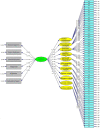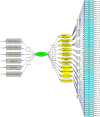Delving into the relationship between teacher emotion regulation, self-efficacy, engagement, and anger: A focus on English as a foreign language teachers
- PMID: 36337515
- PMCID: PMC9627275
- DOI: 10.3389/fpsyg.2022.1019984
Delving into the relationship between teacher emotion regulation, self-efficacy, engagement, and anger: A focus on English as a foreign language teachers
Abstract
Due to the potent role of teachers' emotion regulation in effective teaching, it seems essential to see how emotion regulation can contribute to other relevant teaching constructs. In this regard, the present study is intended to probe into the causal relationship among teacher emotion regulation, self-efficacy beliefs, engagement, and anger. In so doing, the Language Teacher Emotion Regulation Inventory (LTERI), The Teacher Sense of Efficacy Scale (TSES), The Engaged Teacher Scale (ETS), and The Teacher Anger Scale (TAS) were administered to 581 English as a Foreign Language (EFL) teachers in Iran. To gauge the causal relationships among the variables, confirmatory factor analysis (CFA) and structural equation modeling (SEM) using LISREL 8.80 were conducted. The results indicated that language teacher emotion regulation could positively and significantly predict teachers' self-efficacy beliefs and engagement at work. Moreover, the influence of language teacher emotion regulation on the teacher's anger is significantly negative. That is, the stronger emotion regulation is implemented the better teachers can manage their anger. The implications of this study may uncover new prospects for effective teaching, especially during the COVID-19 pandemic.
Keywords: EFL teachers; teacher anger; teacher emotion regulation; teacher engagement; teacher self-efficacy beliefs.
Copyright © 2022 Deng, Heydarnejad, Farhangi and Farid Khafaga.
Conflict of interest statement
The authors declare that the research was conducted in the absence of any commercial or financial relationships that could be construed as a potential conflict of interest.
Figures





Similar articles
-
Measuring Language Teacher Emotion Regulation: Development and Validation of the Language Teacher Emotion Regulation Inventory at Workplace (LTERI).Front Psychol. 2021 Aug 23;12:708888. doi: 10.3389/fpsyg.2021.708888. eCollection 2021. Front Psychol. 2021. PMID: 34497564 Free PMC article.
-
On the Role of Academic Buoyancy and Self-Efficacy in Predicting Teachers' Work Engagement: A Case of Chinese English as a Foreign Language Teachers.Percept Mot Skills. 2024 Apr;131(2):612-629. doi: 10.1177/00315125231222398. Epub 2023 Dec 16. Percept Mot Skills. 2024. PMID: 38103044
-
A Structural Model of Teacher Self-Efficacy, Emotion Regulation, and Psychological Wellbeing Among English Teachers.Front Psychol. 2022 Jun 30;13:904151. doi: 10.3389/fpsyg.2022.904151. eCollection 2022. Front Psychol. 2022. PMID: 35846714 Free PMC article.
-
English as a Foreign Language Teachers' Work Engagement, Burnout, and Their Professional Identity.Front Psychol. 2022 Jun 9;13:916079. doi: 10.3389/fpsyg.2022.916079. eCollection 2022. Front Psychol. 2022. PMID: 35756227 Free PMC article. Review.
-
The Effect of Teachers' Self-Efficacy and Creativity on English as a Foreign Language Learners' Academic Achievement.Front Psychol. 2022 Apr 12;13:872147. doi: 10.3389/fpsyg.2022.872147. eCollection 2022. Front Psychol. 2022. PMID: 35496244 Free PMC article. Review.
Cited by
-
A voyage of discovering the impacts of teacher immunity and emotion regulation on professional identity, autonomy, and work motivation in Iranian EFL landscape.BMC Psychol. 2024 Jan 22;12(1):43. doi: 10.1186/s40359-024-01544-9. BMC Psychol. 2024. PMID: 38254243 Free PMC article.
-
Examining the effects of teacher self-compassion, emotion regulation, and emotional labor strategies as predictors of teacher resilience in EFL context.Front Psychol. 2023 Jul 21;14:1190837. doi: 10.3389/fpsyg.2023.1190837. eCollection 2023. Front Psychol. 2023. PMID: 37546437 Free PMC article.
-
Boosting teacher work engagement: the mediating role of psychological capital through emotion regulation.Front Psychol. 2023 Aug 31;14:1240943. doi: 10.3389/fpsyg.2023.1240943. eCollection 2023. Front Psychol. 2023. PMID: 37720646 Free PMC article.
-
Predicting student self-efficacy in Muslim societies using machine learning algorithms.Front Big Data. 2024 Dec 13;7:1449572. doi: 10.3389/fdata.2024.1449572. eCollection 2024. Front Big Data. 2024. PMID: 39735162 Free PMC article.
-
Burnout among Chinese EFL university instructors: a mixed-methods exploration of school climate, job demands, and emotion regulation.Front Psychol. 2025 Jun 19;16:1549466. doi: 10.3389/fpsyg.2025.1549466. eCollection 2025. Front Psychol. 2025. PMID: 40612987 Free PMC article.
References
-
- Alipour S. H., Kashkouli Z., Ghadiri M. (2021). Validating factor structure of the Persian version of emotion regulation strategies inventory among Iranian EFL university teachers. Appl. Res. Eng. Lang. 10 81–104. 10.22108/ARE.2020.125317.1634 - DOI
-
- Amirian S. M. R., Ghaniabadi S., Heydarnejad T., Abbasi S. (2022). The contribution of critical thinking and self-efficacy beliefs to teaching style preferences in higher education. J. Appl. Res. High. Educ. 10.1108/jarhe-11-2021-0441 [Epub ahead of print]. - DOI
-
- Azari Noughabi M., Amirian S. M. R., Adel S. M. R., Zareian G. (2020). The association of experienced in-service EFL teachers’ immunity with engagement, emotions, and autonomy. Curr. Psychol. 39 220–238. 10.1007/s12144-020-01066-8 - DOI
LinkOut - more resources
Full Text Sources

